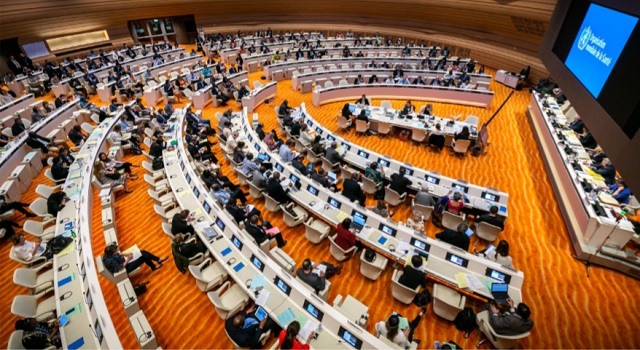
Assembly discusses cost of medicine, environment, climate change
Member States at the World Health Assembly in Geneva, Switzerland have agreed a new global strategy on health, environment and climate change: the transformation needed to improve lives and well-being sustainably through healthy environments.
The annual gathering organised by the UN’s World Health Organisation (WHO) was held from May 20-28 under the theme “Universal health coverage: leaving no-one behind”.
The theme was meant to emphasise that access to health care is a basic human right and is critical for public health, safety and economic security, which many countries of the world are unable to provide. Universal Health Coverage is considered the umbrella target which would help the world meet Sustainable Development Goals (SDGs).
Targets include reduction in child mortality, controlling epidemics and reducing deaths from air pollution.
The Member States agreed a strategy that provides a vision and way forward on how the world and its health community need to respond to environmental health risks and challenges until 2030. Risks include environmental physical, chemical, biological and work-related factors.
They also agreed to accelerate and scale up action to prevent and treat noncommunicable diseases, primarily cancer, diabetes, and heart and lung diseases, and to meet global targets to reduce the number of people dying too young from these diseases.
NCDs are the leading cause of premature death: WHO estimates that 15.2 million people died in 2016, aged between 30 and 70 years, from one of these conditions.
The Health Assembly heard that for the first time since the initial United Nations General Assembly High-level Meeting on NCDs in 2011, there are promising signs that health outcomes are improving thanks to action on NCDs. These include a downward trend in prevalence of tobacco smoking, heavy episodic drinking of alcoholic beverages and raised blood pressure.
Later this year, WHO will publish a technical note setting out indicators for countries to annually measure progress on the commitments they made at the UN General Assembly to address NCDs and include in reports to the United Nations Secretary General.
Ethiopia’s proposal approved
Among the Assembly’s highlights was the approval of Ethiopia’s proposed resolution entitled ‘Community Health Workers delivering Primary Health Care.’ Ethiopia has achieved dramatic progress in improving the health outcomes of its population during the past years thanks to the establishment of health extension program in which health professional provide door to door services.
Member States also agreed to establish World Chagas Day, to be celebrated each year on 14 April. Chagas, a neglected tropical disease, currently affects between 6 and 7 million people, mostly in Latin America. They also declared 2020 the Year of the Nurse and the Midwife.
Delegates also adopted a decision to request WHO, inter alia, to work with the Global Influenza Surveillance and Response System (GISRS) and other partners to improve influenza virus sharing, and to prepare a report with Member States and stakeholders on influenza virus sharing and public health in the context of legislation and regulatory measures including those implementing the Nagoya Protocol.
Going into the meeting, over 100 civil society organisations and individuals published an open letter to WHO member states, urging them to oppose proposed changes to a draft resolution to improve the transparency of markets for medicines, vaccines, and other health technologies. They were concerned the changes proposed by a number of high-income countries weaken the language on transparency, making it “confusing, weak and practically useless in many areas.” One of the changes involves the costs associated with all human clinical trials, including public funding and tax incentives.
Ebola threat discussed
Under the management of pendamics, the continued rise in Ebola cases in the DR Congo and the threat of the virus spilling over to neighboring countries was a major concern. Many wanted a rethink of the response, especially in view of attacks on Ebola treatment centers.
The assembly also reviewed a new strategy on snakebites. It is estimates that between 81,000-138,000 people die of snakebites each year around the world. The new strategy aims to halve deaths and disability from snakebite by 2030 by focusing on four areas: working with communities via education and research; including on behavior change, safe, effective treatment; with WHO creating a stockpile of antivenoms, better integrating snakebite into health systems, and “transformational public private investment”. A new guideline from WHO looks to improve best practices and working conditions for community health workers. Delegates considered three health workforce items, including progress on the WHO Global Strategy on Human Resources for Health, key principles on designing community health worker programs, and national reporting on international recruitment of health workers. The role of western countries in attracting health workers from poorer countries was also discussed.
The discussions of the Health Assembly are meant to feed into the high-level meeting on UHC, taking place Sept. 23, a day before the official opening of the U.N. General Assembly in New York. But the goal is to translate the meeting’s outcomes to meaningful actions in countries.
****
 The Independent Uganda: You get the Truth we Pay the Price
The Independent Uganda: You get the Truth we Pay the Price


